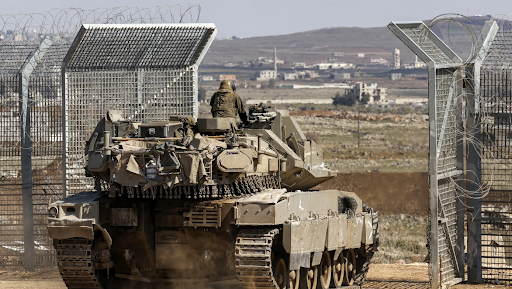 |
Understanding Israel’s Covert and Overt Actions in Syria
Israel’s involvement in Syria extends far beyond headline-grabbing airstrikes. Beneath the surface lies a web of military strategy, geopolitical alignment, intelligence operations, and long-term deterrence doctrine. Syria, fragmented and war-torn, provides both a threat and an opportunity for Israel’s defense establishment and political elite.
Israeli strikes on Syrian territory, particularly in the south and around Damascus, have intensified. The declared objective is to curb Iranian entrenchment and stop weapons transfers to Hezbollah. However, these actions also serve broader strategic interests—including deterrence signaling, domestic political distraction, and positioning within global power dynamics.
Iran-Israel Proxy Conflict: The Syrian Frontline
Syria has become the central theater in the Iran-Israel shadow war. Iran’s Islamic Revolutionary Guard Corps (IRGC) and proxy militias, such as Hezbollah and Liwa Fatemiyoun, maintain military infrastructure in Syria. Israel perceives this as an existential threat, prompting a proactive “campaign between wars” (MABAM) to degrade Iranian capabilities without triggering full-scale war.
Israel’s precision strikes have targeted:
-
IRGC bases and logistical nodes
-
Advanced missile depots
-
Weapons convoys en route to Lebanon
-
Syrian air defense installations
This military calculus is shaped by the need to prevent Iran from establishing a permanent, missile-capable military corridor from Tehran to the Mediterranean.
Geopolitical Opportunism: Exploiting the Syrian Vacuum
Israel's sustained operations in Syria are facilitated by the fragmented sovereignty of the Syrian state and tacit regional acceptance. The lack of centralized power, coupled with the international community’s fractured focus, grants Israel relative freedom of maneuver.
Key advantages Israel leverages:
-
Russian Deconfliction Agreements: Israel coordinates with Russian forces in Syria to avoid direct confrontation, especially near the Khmeimim Airbase.
-
U.S. Strategic Alignment: American support for Israeli strikes against Iranian-linked targets bolsters Israel’s legitimacy on the global stage.
-
Arab Normalization Momentum: The Abraham Accords reduce Arab states’ resistance to Israeli military actions in the region.
Domestic Political Utility of Foreign Engagements
Israeli leadership often turns to external military operations to project strength and unify domestic opinion. Strikes in Syria—framed as necessary for national security—help distract from internal political instability, judicial reform protests, and socioeconomic issues.
This pattern reflects a long-standing tradition of rallying domestic support through assertive foreign policy moves. The media coverage of successful operations against Iranian targets boosts the image of Israeli leaders as protectors of national sovereignty.
Syria’s Internal Chaos as Strategic Leverage
The fragmentation of Syria’s sovereignty enables external actors to manipulate power dynamics. Israel capitalizes on:
-
Lack of unified command in Syrian military
-
Multiplicity of foreign actors—Russia, Iran, Turkey, and U.S.—complicating Syria’s air defense grid
-
Dilapidated infrastructure making precision attacks more impactful
This environment allows Israel to maintain a policy of plausible deniability and low-risk engagement while severely degrading adversary capabilities.
The Role of Intelligence and Cyber Operations
Israel’s dominance in signals intelligence (SIGINT) and cyber warfare provides a crucial edge in Syria. Real-time surveillance of weapons shipments, militia movements, and communications networks allows for:
-
Pre-emptive strikes on convoys
-
Interception of IRGC logistics
-
Disruption of drone and missile programs
The fusion of Mossad’s external intelligence with IDF’s operational command ensures high-impact precision without collateral diplomatic fallout.
Regional Implications and Long-Term Strategy
Israel’s operations in Syria serve broader regional objectives. These include:
-
Preventing the formation of a “Shiite Crescent” stretching from Iran through Iraq, Syria, and Lebanon
-
Reinforcing deterrence credibility in the eyes of adversaries like Hezbollah and Hamas
-
Securing the Golan Heights against any resurgence of Syrian military capabilities
The long-term strategy is not merely defensive; it aims to reshape the security architecture of the Levant by keeping Syria fragmented and hostile proxies weakened.
Conclusion: Israel’s Calculated Persistence in the Syrian Theater
Israel’s involvement in Syria is not reactive, but methodical. The strikes are part of a larger strategy—one that encompasses deterrence, intelligence dominance, regional balance, and domestic stability. While Iran remains the tactical target, the ultimate objective is strategic hegemony in the post-Arab Spring Levant.
By maintaining operational superiority and leveraging geopolitical shifts, Israel ensures that Syria remains a buffer zone rather than a base for existential threats. This calibrated engagement is central to Israel’s national security doctrine for the foreseeable future.
